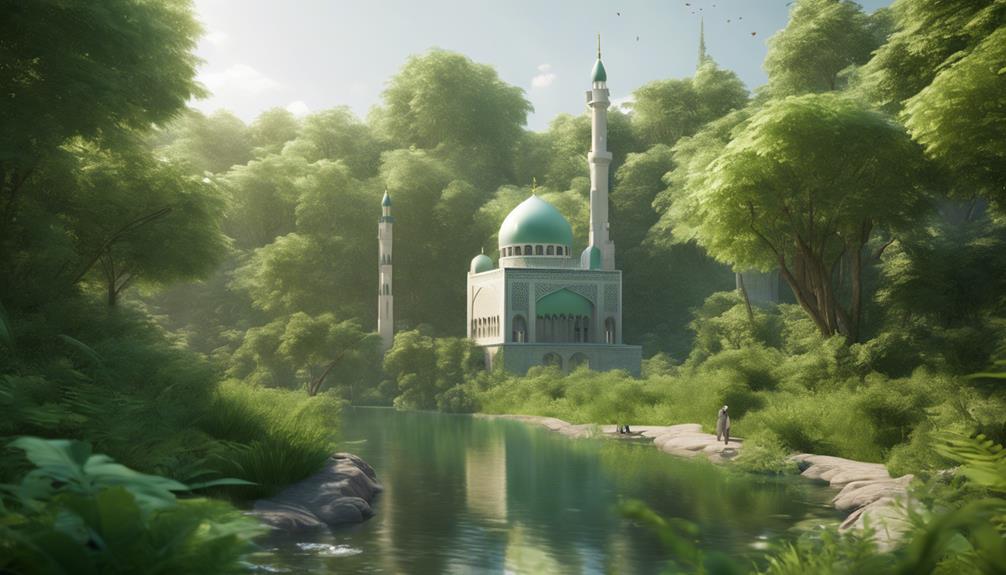
As a comprehensive way of life, Islam offers profound insights into environmental stewardship, advocating for a harmonious relationship between humanity and the natural world. Central to Islamic teachings are principles that emphasize the responsible use of resources, the protection of biodiversity, and the promotion of sustainability.
1. The Concept of Khilafah (Stewardship)
In Islam, humans are regarded as khalifah (stewards) on Earth, entrusted with the responsibility to manage and protect the environment. This concept underscores the duty to act as caretakers, ensuring that natural resources are used wisely and preserved for future generations. The Qur’an states:
“It is He who has made you successors upon the earth…”
2. The Principle of Tawhid (Oneness of God)
The concept of tawhid emphasizes the oneness of God, highlighting the interconnectedness of all creation. Recognizing that everything in the universe is a manifestation of God’s will fosters a sense of unity and respect towards nature. This perspective encourages Muslims to view environmental degradation as a disruption of the natural harmony established by God.
3. The Notion of Mizan (Balance)
Mizan refers to the balance and harmony inherent in God’s creation. Islam teaches that the universe operates on a precise equilibrium, and humans are responsible for maintaining this balance. The Qur’an mentions:
“And the heaven He raised and imposed the balance.”
This principle extends to environmental conservation, advocating for sustainable practices that do not disrupt the ecological balance.
4. Prohibition of Wastefulness (Israf)
Islam strongly condemns wastefulness, encouraging moderation and gratitude for God’s provisions. The Qur’an advises:
“Eat and drink, but waste not by excess; Verily He loves not the excessive.”
This teaching promotes efficient resource use and discourages practices that lead to environmental harm.
5. Conservation of Water
Water is considered a sacred gift in Islam, and its conservation is of utmost importance. The Prophet Muhammad (PBUH) is reported to have said:
“Do not waste water, even if you perform your ablution on the banks of an abundantly flowing river.”
This highlights the significance of preserving water resources and using them judiciously.
6. Protection of Biodiversity
Islam acknowledges the intrinsic value of all living beings and emphasizes the importance of protecting biodiversity. The Qur’an describes animals and plants as communities like humans, deserving of respect and protection. Prophet Muhammad (PBUH) established protected areas known as Hima to conserve wildlife and natural habitats.
7. Afforestation and Tree Planting
Planting trees is highly encouraged in Islam, viewed as a charitable act that benefits both the environment and society. The Prophet Muhammad (PBUH) said:
“If a Muslim plants a tree or sows seeds, and then birds, or humans, or animals eat from it, it is regarded as a charitable gift (Sadaqah) for him.”
This teaching promotes environmental sustainability and community welfare.
8. Ethical Treatment of Animals
Islam advocates for the humane treatment of animals, prohibiting cruelty and encouraging kindness. The Prophet Muhammad (PBUH) cautioned against overburdening animals and emphasized their rights. He stated:
“A woman was punished in Hell because of a cat which she had confined, neither giving it food nor setting it free to eat from the vermin of the earth.”
This underscores the ethical responsibility humans hold towards animals.
9. Sustainable Land Use
Islamic teachings promote sustainable land use, discouraging practices that lead to land degradation. The concept of Emarat al-Ard (development of the land) encourages the cultivation and productive use of land, provided it does not harm the environment. The Prophet Muhammad (PBUH) said:
“Whoever revives barren land, for him is a reward therein.”
10. Accountability and the Hereafter
Islam teaches that individuals will be held accountable for their actions concerning the environment in the Hereafter. This belief fosters a sense of responsibility and encourages Muslims to engage in practices that preserve the Earth for future generations.
FAQs
- What is the role of RAS technology in the UAE’s fish farming?
- RAS technology recycles water within fish tanks, reducing water usage and space requirements, and allows precise control over environmental conditions, enhancing fish growth and health.
- RAS technology recycles water within fish tanks, reducing water usage and space requirements, and allows precise control over environmental conditions, enhancing fish growth and health.
- How does AI monitoring benefit fish farms in the UAE?
- AI monitoring systems provide real-time data on fish health, water quality, and feeding schedules, enabling early disease detection and optimal breeding conditions, thus improving efficiency and productivity.
- AI monitoring systems provide real-time data on fish health, water quality, and feeding schedules, enabling early disease detection and optimal breeding conditions, thus improving efficiency and productivity.
- What is the significance of offshore aquaculture in the UAE?
- Offshore aquaculture offers more consistent water quality and reduces the need for extensive land-based operations, contributing to sustainable and efficient fish farming practices.
- Offshore aquaculture offers more consistent water quality and reduces the need for extensive land-based operations, contributing to sustainable and efficient fish farming practices.
- How does sustainable waste management work in the UAE’s fish farms?
- Innovative waste management systems convert fish farm waste into valuable byproducts like bioenergy or organic fertilizers, promoting a circular economy and reducing environmental pollution.
- Innovative waste management systems convert fish farm waste into valuable byproducts like bioenergy or organic fertilizers, promoting a circular economy and reducing environmental pollution.
- What are the future projections for the UAE’s aquaculture industry?
- The industry is projected to continue its growth, with revenues expected to reach USD 1.38 billion by 2025 and USD 1.46 billion by 2030, supported by government investments aimed at increasing domestic production and achieving seafood self-sufficiency.
Conclusion
Islam’s teachings provide a comprehensive framework for environmental stewardship, emphasizing humanity’s role as caretakers of the Earth. By embracing principles such as stewardship (khalifah), balance (mizan), and moderation, Muslims are guided to interact responsibly with the environment. These teachings encourage sustainable resource use, protection of biodiversity, and ethical treatment of all living beings. Incorporating these values into daily life not only fulfills a religious obligation but also contributes to the well-being of the planet and future generations.
